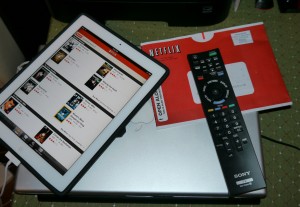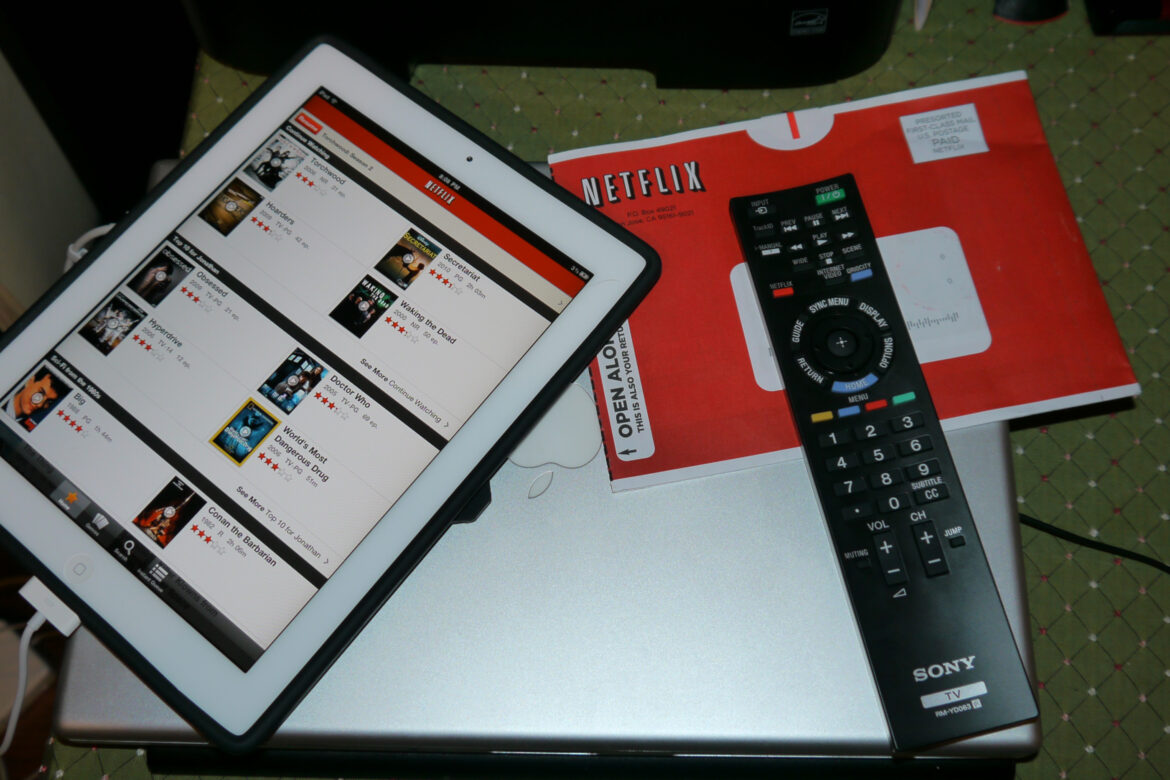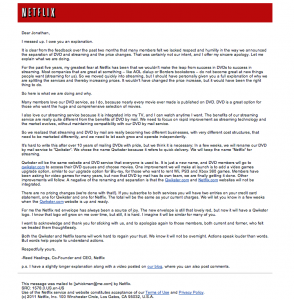 This morning I awoke to an email from Netflix CEO and co-founder Reed Hastings. No, it wasn’t a personal correspondence although it masqueraded as one because Mr. Hastings, or Reed to his friends, used my first name in the salutation.
This morning I awoke to an email from Netflix CEO and co-founder Reed Hastings. No, it wasn’t a personal correspondence although it masqueraded as one because Mr. Hastings, or Reed to his friends, used my first name in the salutation.
The full text of the email appears below, but the gist of it is that Netflix.com is ridding itself of the dvd-by-mail service that made it a hit. That service will now become a new business called Qwikster.com.
There are some interesting things about Mr. Hastings’ email (although he refers to me as “Jonathan,” I do not know the Netflix captain of industry personally and will refer to him formally). First, it is interesting that he tries to appeal directly to his customers with such a casual email. It is as though he is trying to extend directly to his consumer base the latte swilling, shorts wearing, “fun guy” management approach that served him so well over the past 10 years. Is this a confident move or one saturated with the faint whiff of desperation?
And second, in his email he actually compares his company to sinking ships AOL and Borders. While AOL is still alive, Borders is practically no more having seen its once ubiquitous stores close around the country. The sophisticated point that will likely be lost on some Netflix investors is that like AOL, who staked a large claim in dial-up Internet service, and Borders, who could not jump from paper to digital books, Netflix will be able to divest itself entirely of the old ways and endorse the new ones successfully.
Streaming is replacing the old dvd-by-mail service. DVD and even Blu-Ray are becoming outmoded formats. At present, Netflix offers dvds of new movies by mail. That service is moving to Qwikster.com. Currently, Netflix’ streaming options are limited to older offerings. Amazon and Apple and countless other services have moved in to fill the void. Streaming new releases is the future of the business, and Netflix needs to climb aboard the train.
 How can Netflix survive? Price is one solution. Amazon’s Prime service is cheaper and contains much of what Netflix already has. While it is not available to Apple TV owners, all the other hardware devices in my home (Sony Bravia TV and Roku and even the PS3) contain Amazon’s service. The proliferation of the Amazon app and the bargain that is the Prime membership make Amazon the natural competitor to Netflix if not its ultimate successor. When Amazon launches it’s $250 tablet later this year integrating its app store, cloud music and video services in one device, it may even challenge the behemoth Apple in the tablet space. Having all these services in one neat package will be hard to beat as Apple has proven, but Netflix could be the big loser having the app but not the flashy hardware to go with it.
How can Netflix survive? Price is one solution. Amazon’s Prime service is cheaper and contains much of what Netflix already has. While it is not available to Apple TV owners, all the other hardware devices in my home (Sony Bravia TV and Roku and even the PS3) contain Amazon’s service. The proliferation of the Amazon app and the bargain that is the Prime membership make Amazon the natural competitor to Netflix if not its ultimate successor. When Amazon launches it’s $250 tablet later this year integrating its app store, cloud music and video services in one device, it may even challenge the behemoth Apple in the tablet space. Having all these services in one neat package will be hard to beat as Apple has proven, but Netflix could be the big loser having the app but not the flashy hardware to go with it.
A tablet is not in Netflix’ future and isn’t required for it to compete moving forward. The key for the company is in offering new releases and interacting with its customers more on a personal basis. Back in the 1980s when I was an employee at one of the biggest video stores in south Atlanta, my boss wisely prevented me from touting that our store had the largest collection of old movies in the area. The people wanted new movies, and even if they also rented old ones, the new releases got them in the door.
But in addition to providing the latest hot films, what’s missing from the streaming services that the dvd-by-mail ones provide? The dvd experience is more than just stream deep. Recently, in my hometown the last remaining video store, ironically a store named Hastings, closed down. No more could my children and I wander through the dvd shelves and arrive as if by some magical force at the movie of the evening. Taking home the boxed specialty on a Friday night was wonderful. Pizza and a movie after spending time in the video store was a pleasant routine. Ah, the bygone days….
Aside from the video store experience, streaming, as far as I know, does not offer the extra material that dvds contain. There isn’t even a scene list. The trailer can be found on YouTube, but there is nothing like having access to it and the director commentary and other extras on the one disc. And what will become of easter eggs, the hidden material on discs that once was coveted by movie fanboys all over the Internet? Sure, blue-ray may contain these options, and my comments about dvd certainly applies to the higher resolution discs as well. But the entire dvd experience has yet to be successfully transferred to a streaming service.
Here’s what I’d like to see Netflix do to reignite my interest in their brand: (1) Rehire James Rocchi; (2) Open Netflix stores around the country; (3) Start renting new movies on their streaming service; and (4) Keep prices low.
 (1) Rehire James Rocchi. Years ago, I was the president and editor of a popular movie website called Einsiders.com. It was one of the first of its kind. A blog type website, I aspired to make it more like a movie criticism magazine. My goal was to feature insightful criticism and commentary but not to become a news aggregator or to follow the celebrity chatter. My failure with that project has forever left a deep wound on my psyche, but the lessons learned are valuable. While helming Einsiders.com, I had occasion to interview then Netflix film critic James Rocchi as he traveled around the country promoting the dvd-by-mail service. James is still writing and appearing on television, but back then, as he started his career, he offered a wonderful and critical eye into what Netflix was all about.
(1) Rehire James Rocchi. Years ago, I was the president and editor of a popular movie website called Einsiders.com. It was one of the first of its kind. A blog type website, I aspired to make it more like a movie criticism magazine. My goal was to feature insightful criticism and commentary but not to become a news aggregator or to follow the celebrity chatter. My failure with that project has forever left a deep wound on my psyche, but the lessons learned are valuable. While helming Einsiders.com, I had occasion to interview then Netflix film critic James Rocchi as he traveled around the country promoting the dvd-by-mail service. James is still writing and appearing on television, but back then, as he started his career, he offered a wonderful and critical eye into what Netflix was all about.
By praising and criticizing the very product that Netflix was providing (then by mail only), Rocchi gave the impression that Netflix cared about what you watched and wanted to help you in your selection. Now that process is largely administered by a computer that offers up suggestions some of which are ludicrous. Netflix should rehire Rocchi, and he should arm himself with a trusted team of writers who will interact with Netflix customers and bring back the video store/dvd experience in this digital streaming age. And this idea leads me to my next suggestion. Reed are you listening?
(2) Open Netflix stores around the country. Recently, I had occasion to spend some time in a new Microsoft store in Atlanta. It was like some kind of cheesy Apple “Stoer.” If you’ve been following the developments over at Apple these days, they have been working with the Chinese authorities to shut down fake Apple stores around that country. Such stores sell real and knock-off products and try to fool you by misspelling ever so subtly the names of things like “Store” as “Stoer.”
The Microsoft store in Atlanta was like a Apple store knock-off but contained products that were running variations of Microsoft software. And the concept is brilliant for brand awareness and should boost the cool factor. As an aside, the Microsoft store is much more comfortable than its Apple counterpart located within the same shopping mall. While the comfort level certainly has to do with the lack of traffic in the Microsoft store, the store did seem to have more seating and openly encouraged hanging out whereas over at Apple things were dare I say a little dated and colder and less inviting. The Apple store reminds me of the old white plastic MacBook that has been recently discontinued. And don’t get me wrong, I own several Macs and love the products. But the focus of the Microsoft store it seemed wasn’t to sell products necessarily but primarily to raise our awareness of them.
A Netflix store could distinguish itself in the mall marketplace. Resembling a video store of old, it should feature rows of dvds for sale and for rental. But the thrust of the store wouldn’t be to sell things but to offer a personal service to Netflix cutomers—what should you watch? Apple might have “geniuses” and their “genius bar,” but the Netflix store would have “critics” and the “box office.” Employees at the Netflix store would be schooled in cinema and carry tablet computers loaded with the Netflix database permitting them to, with your permission, pull up your recently watched list and help you select a movie or television show. This in store service would be coupled with a Netflix social network in which Netflix critics would personally interact with customers.
And the Netflix personal service would cost nothing. That’s right, visit the Netflix store, get advice, sign up for Netflix services, and pay absolutely nothing for the hip convenience. The central reason for the store’s existence is to tell customers, “we care about your viewing experience and we remember that the old ways of doing things do not have to be forgotten, and can, in fact, enhance the future of the streaming business.” The dirty little secret will be that if you hang out in the Netflix store, and bond with your “personal movie critic” you won’t likely turn to Amazon or the other services when you return to your home. Such a store would be good for business.
(3) Start renting new movies on Netflix’ streaming service. As far as I know, you cannot rent new releases on Netflix through their streaming service. This forces folks like me to turn to other services on a Friday night to catch the new releases of the month. If Netflix offered new releases, I’d not likely go elsewhere. Certainly, this is in the works at Netflix but the sooner the better because the marketplace is becoming crowded.
(4) Keep prices low. Okay, like the last suggestion, this one seems very simple. However, the backlash against Netflix recently has to do with price increases. In order to keep more people from jumping ship, prices must stay low. Amazon’s service is very good and cheaper offering a better value than that offered by Netflix. In fact, I have both Netflix and Amazon. Why? Because Amazon offers new releases and its service is part of my Prime membership. The synergy that Amazon offers will be formidable. This is why Netflix needs to do something radical like adding the personal touch that will set Netflix apart from the juggernaut online seller of almost everything.
I have a soft spot for Netflix. Before they became a publicly traded company, my business partner and I traveled to their headquarters and pitched them a print magazine we called the Netflix Insider. Twenty minutes later, we were out of there with the statement from the Netflix representative that they “were not looking for any new streams of revenue at that time.” Now, streaming is only part of their battle. Netflix must adapt or die and that means doing something no one else is doing and making it work.
With the competition eroding Netflix’ hold on the streaming video market, the company must look for new sources of revenue. Renting new releases is one such stream. Advertising within the Netflix store model mentioned above could be another. Partnerships with coffee shops and other places where people hang out could offer another option for the Netflix store idea. But no matter what move is pursued to breathe hipness into the brand, the company desperately needs a boost. And instead of just raw price breaks and the mad rush to offer the latest new release, Netflix must not forget the key ingredient—customer loyalty. Owners of iPads and Apple devices line up and wait for hours for the latest product release. The brand transcends what its products can do and have become one of the biggest fashion statements in one’s wardrobe. Netflix is quickly becoming as square at Blockbuster and as the marketplace becomes clogged with competitors, Netflix’ fate could potentially be that of its blue predecessor.
Mr. Hastings, thanks for your email. My friends do call me Jonathan, but do you really know me? And for that matter, how many of your customers can you truly address by their first names? It’s time to get to know your customers again like no one else in the growing marketplace.



